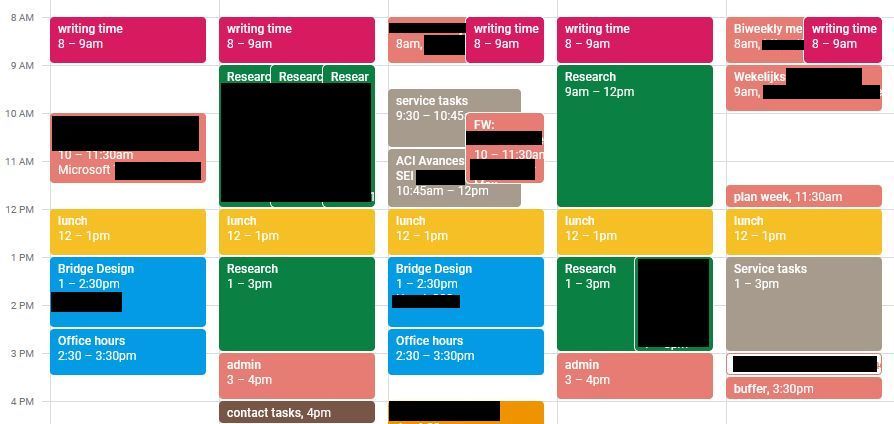
Think day 1: workshop outline and exercises
For anybody interested in trying out the reflection workshop I designed for myself – you can find it in today’s post. I’m sharing here what I had originally prepared. In the end, I did not have time or energy to do the final wrap up, and I decided to skip some of the exercises, but you get an idea about what is possible.
Preparation (15 minutes)
- Set up a comfortable and quiet workspace.
- Have a journal or computer for writing, and a timer.
- Begin with a 5-minute meditation to clear your mind and set intentions.
Part 1: Discovering Your Zone of Genius (1 hour, 45 minutes)
- Introduction (10 minutes): Read through the Zone of Genius exercises to familiarize yourself with the flow.
- Exercises 1-10 (60 minutes): Spend 6 minutes on each prompt, writing freely.
- Break (5 minutes): Short walk/stretch.
- Exercises 11-20 (60 minutes): Spend 6 minutes on each prompt.
- Reflection (10 minutes): Review your responses, highlighting insights and common themes.
Part 2: Confronting the Upper Limit Problem (1 hour, 45 minutes)
- Introduction (10 minutes): Read through the Upper Limit Problem exercises to understand your objectives.
- Exercises 21-30 (60 minutes): Spend 6 minutes on each, identifying your upper limit behaviors.
- Break (5 minutes): Mindfulness breathing.
- Exercises 31-40 (60 minutes): Continue with 6 minutes per exercise, focusing on overcoming these limits.
- Reflection (10 minutes): Note down the most striking revelations and consider how to implement changes.
Part 3: Integration and Action Planning (1 hour, 15 minutes)
- Review (15 minutes): Go over your work from Parts 1 and 2. Draw connections between your Zone of Genius and Upper Limit Problem findings.
- Action Steps (30 minutes): Choose 5 insights from today that you feel are most impactful. Develop a concrete action step for each insight that you can take in the next week.
- Break (5 minutes): Short walk/stretch to clear your mind.
- Commitment (10 minutes): Write a commitment to yourself about pursuing your Zone of Genius, addressing your Upper Limit Problems, and following through on your action steps.
- Closing Reflection (15 minutes): Reflect on the entire workshop. What did you learn about yourself? How do you feel about your Zone of Genius and Upper Limit Problems now?
Wrap-Up (10 minutes)
- Organize Materials (5 minutes): Collect all your notes and responses in one place.
- Closing Gratitude (5 minutes): End with a gratitude practice, acknowledging your effort and any new self-awareness you have gained.
Post-Workshop
- Schedule time in the coming weeks to review your notes and progress on action steps.
- Consider setting up periodic check-ins with yourself to continue this work.
Here are the exercises that I used (note that I skipped some and found some a bit repetitive so I also skipped those):
Zone of genius reflection:
- Reflection on Joy and Engagement: List activities that make you lose track of time and feel a sense of joy. Explore why these activities engage you so deeply.
- Dreams Analysis: Write about your dreams and aspirations as a child. What brought you unadulterated happiness? Look for clues to your Zone of Genius.
- Peak Experiences: Recall three peak experiences in your life—times when you felt at your best. Identify what was common in these experiences.
- The Compliment Exercise: Note down the compliments you often receive. What skills or qualities are people acknowledging in you?
- Journaling Your Best Self: Write a journal entry from the perspective of a day lived fully in your Zone of Genius. What are you doing? How does it make you feel?
- Flow State Triggers: Identify moments when you’ve been in a flow state. What were you doing? What conditions helped create this state?
- Life Themes: Look for recurring themes in your life—subjects you’re drawn to, activities you love, or causes you’re passionate about. These can point to your Zone of Genius.
- Feedback Solicitation: Ask five people what they see as your greatest strengths and gifts. Note the patterns in their responses.
- Experimentation Diary: Try a new activity each week and journal about your experience. Did the activity energize or drain you? What did that tell you about your Zone of Genius?
- Skills Inventory: Make a list of all the skills you possess, including ones you don’t use in your current job or daily life. Which of these do you enjoy using the most?
- Authenticity Check: Reflect on when you feel most authentic. What are you usually doing during these times? This can signal where your Zone of Genius lies.
- Ideal Day Visualization: Visualize your ideal day from morning to night. What activities are you doing that make you feel fulfilled and happy?
- Barrier Identification: Write about the barriers you perceive in accessing your Zone of Genius. How might you overcome these barriers?
- Energy Mapping: Track your energy levels throughout the week. When are they highest? What activity are you doing at this time?
- Success Deconstruction: Think about a recent success. Break down the elements of what made you successful. How can these elements be applied to finding your Zone of Genius?
- Learning from Failure: Write about a recent failure. What did you learn about your abilities and preferences that could guide you to your Zone of Genius?
- Mentor Imagining: Imagine having a conversation with a mentor you admire. What advice would they give you about finding your Zone of Genius?
- The Letter From Future Self: Write a letter to your current self from your future self, who has found and is operating in their Zone of Genius. What insights do they share?
- The Elimination List: Identify what tasks or activities you’re willing to stop doing to make room for discovering and working in your Zone of Genius.
- The Genius Declaration: Craft a statement that declares your intent to find and work within your Zone of Genius. Refer to it daily to reinforce your commitment.
Upper Limit Problem reflection:
- Daily Upper Limit Diary: Keep a diary for a month, noting when you feel exceptionally good and when you don’t. Look for patterns that suggest self-sabotage after high points.
- Trigger Tracking: Make a list of events that trigger your Upper Limit Problem. Reflect on the feelings and thoughts that arise when you hit your upper limit.
- Gratitude Practice: Start and end each day by writing down three things you’re grateful for. Noticing abundance can help expand your capacity for success and happiness.
- Reframing Exercise: When you notice an Upper Limit Problem thought, consciously reframe it into a positive one. For example, change “I always mess up good things” to “I deserve to have good things in my life.”
- Mindfulness Meditation: Spend 10 minutes each day in mindfulness meditation, focusing on your breath. When thoughts of self-sabotage arise, acknowledge them without judgment and return to your breath.
- Success Visualization: Visualize yourself enjoying a higher level of success without any negative consequences. What does it feel like? What are you doing differently?
- Comfort Zone Challenges: Deliberately step out of your comfort zone once a week and observe your feelings and thoughts. Write about the experience and what you learned.
- Joy Spotting: Create a joy journal. Whenever you feel a moment of joy, write it down. Reflect on whether you allowed yourself to fully experience it or if you cut it short.
- Thermostat Setting Reflection: Reflect on your family’s attitudes towards success and happiness. How might these have influenced your internal thermostat settings?
- Body Awareness: When you feel you’re hitting an upper limit, stop and scan your body. Where do you feel tension? Breathing into these areas can help release the limit.
- Affirmation Creation: Write a set of affirmations that affirm your right to ongoing success and happiness. Repeat these affirmations daily.
- The Blame Game: Notice when you blame others for feeling bad or when things go wrong. Write about these instances and how you might own your role in them.
- Limiting Beliefs: Identify and write down the beliefs that limit you. Challenge each belief by finding evidence of the opposite in your life.
- Breakthrough Goal Setting: Set a goal that is beyond what you think is possible. Break it down into steps and work on it daily, noting the upper limit problems as they arise.
- Success Sharing: Regularly share your successes with a trusted friend or mentor who celebrates them with you. This can help normalize higher levels of success.
- Permission Slip: Write yourself a permission slip to excel and be happy beyond your perceived limits. Keep it somewhere you can see it daily.
- The Sabotage Alert System: Create a list of self-sabotage behaviors you’ve engaged in. Be alert to these behaviors and when you notice one, pause and make a different choice.
- Upper Limit Mantra: Develop a personal mantra to counteract the Upper Limit Problem. For example, “I expand in abundance, success, and love every day, as I inspire those around me to do the same.”
- The Role Model Exercise: Identify people who embody what it means to live beyond upper limits. Study their lives and actions for inspiration.
- Letter of Release: Write a letter to yourself releasing you from the patterns that cause your Upper Limit Problems. Include a commitment to embracing your potential.
Overall Big Leap questions:
- Reflection on Joy and Engagement: List activities that make you lose track of time and feel a sense of joy. Explore why these activities engage you so deeply.
- Dreams Analysis: Write about your dreams and aspirations as a child. What brought you unadulterated happiness? Look for clues to your Zone of Genius.
- Peak Experiences: Recall three peak experiences in your life—times when you felt at your best. Identify what was common in these experiences.
- The Compliment Exercise: Note down the compliments you often receive. What skills or qualities are people acknowledging in you?
- Journaling Your Best Self: Write a journal entry from the perspective of a day lived fully in your Zone of Genius. What are you doing? How does it make you feel?
- Flow State Triggers: Identify moments when you’ve been in a flow state. What were you doing? What conditions helped create this state?
- Life Themes: Look for recurring themes in your life—subjects you’re drawn to, activities you love, or causes you’re passionate about. These can point to your Zone of Genius.
- Feedback Solicitation: Ask five people what they see as your greatest strengths and gifts. Note the patterns in their responses.
- Experimentation Diary: Try a new activity each week and journal about your experience. Did the activity energize or drain you? What did that tell you about your Zone of Genius?
- Skills Inventory: Make a list of all the skills you possess, including ones you don’t use in your current job or daily life. Which of these do you enjoy using the most?
- Authenticity Check: Reflect on when you feel most authentic. What are you usually doing during these times? This can signal where your Zone of Genius lies.
- Ideal Day Visualization: Visualize your ideal day from morning to night. What activities are you doing that make you feel fulfilled and happy?
- Barrier Identification: Write about the barriers you perceive in accessing your Zone of Genius. How might you overcome these barriers?
- Energy Mapping: Track your energy levels throughout the week. When are they highest? What activity are you doing at this time?
- Success Deconstruction: Think about a recent success. Break down the elements of what made you successful. How can these elements be applied to finding your Zone of Genius?
- Learning from Failure: Write about a recent failure. What did you learn about your abilities and preferences that could guide you to your Zone of Genius?
- Mentor Imagining: Imagine having a conversation with a mentor you admire. What advice would they give you about finding your Zone of Genius?
- The Letter From Future Self: Write a letter to your current self from your future self, who has found and is operating in their Zone of Genius. What insights do they share?
- The Elimination List: Identify what tasks or activities you’re willing to stop doing to make room for discovering and working in your Zone of Genius.
- The Genius Declaration: Craft a statement that declares your intent to find and work within your Zone of Genius. Refer to it daily to reinforce your commitment.



